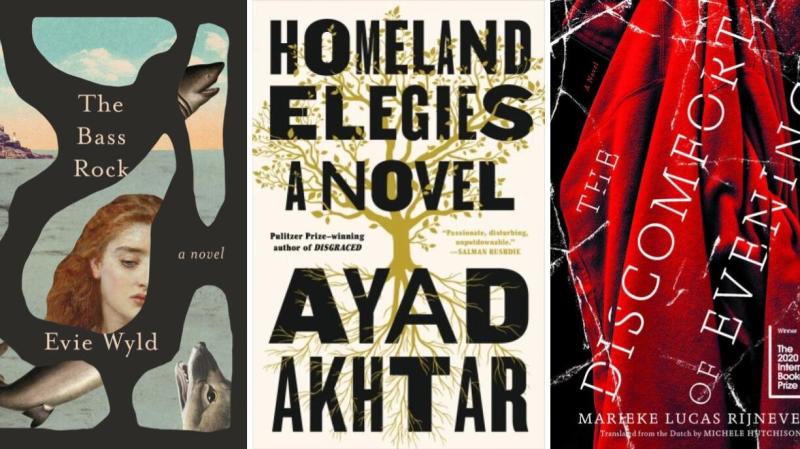11 New Books We Recommend This Week - The New York Times



Sept. 17, 2020
We bring you a passel of new fiction this week — much of it manifestly concerned with politics, in keeping with last weekend's theme issue of the Book Review, and much of it looking far beyond America: from the Scottish coast of Evie Wyld's "The Bass Rock" to the Uganda of Jennifer Nansubuga Makumbi's "A Girl Is a Body of Water" to the multiverse copies of Earth in Micaiah Johnson's "The Space Between Worlds."
Naturally America is represented here too: in Ayad Akhtar's appealingly knotty "Homeland Elegies" and Yaa Gyasi's "Transcendent Kingdom" and Michael Gorra's "The Saddest Words," which delves into the ways that William Faulkner grappled in his work with the legacy of slavery. That one is nonfiction, of course, but it is about fiction — and about politics — so it sits comfortably on the shelf with the rest of these books. Happy reading.
HOMELAND ELEGIES,by Ayad Akhtar. (Little, Brown, $28.) The latest novel from Akhtar is about the dream of national belonging that has receded for American Muslims in the years since 9/11. At once deeply personal and unreservedly political, the book often reads like a collection of essays illustrating the author's prismatic identity. Our critic Dwight Garner calls it "a beautiful novel about an American son and his immigrant father that has echoes of 'The Great Gatsby' and that circles, with pointed intellect, the possibilities and limitations of American life."
THE BASS ROCK,by Evie Wyld. (Pantheon, $27.95.) Set on the rugged Scottish coast and opening with the discovery of a woman's body in a suitcase, Wyld's wondrous and disturbing third novel shuffles between three historical periods to convey its theme, which is the perennial nature of male violence against women. "The message it leaves you with — down to its expertly chilling final line — is certainly dark," our reviewer John Williams writes. "But in delivering it, Wyld consistently entertains, juggling the pleasures of several different genres."
THE DISCOMFORT OF EVENING,by Marieke Lucas Rijneveld. Translated by Michele Hutchison. (Graywolf, paper, $16.) The title of this best-selling Dutch novel, which in August won the International Booker Prize, refers to the point in the evening when cows begin to low and call for relief, their udders heavy with milk. But the story — set among dairy farmers who belong to a strict Protestant sect and who have recently lost their oldest child in an ice-skating accident — is about painful repletion of another kind, and of solace that never arrives. "This is Rijneveld in short: an earthy and irreverent new voice, thrillingly uninhibited in style and subject matter," our critic Parul Sehgal writes. "The novel teems — I say this admiringly — with all the filth of life."
THE SPACE BETWEEN WORLDS,by Micaiah Johnson. (Del Rey, $28.) Hundreds of versions of Earth exist in this debut science-fiction novel, and Cara can travel to most of them to help her employer extract resources and information. As a metaphor for neoliberal imperialism, this tale is profoundly satisfying; as a work of art, it's even better. "Cara is so mesmerizing a character that I was helpless before every twist and turn of plot, riveted by her pain, love and secrets," Amal El-Mohtar writes, reviewing it in her latest Otherworldly column. "The book remained two steps ahead of my imagination, rattling it out of complacency and flooding it with color and heat."
THE GLASS KINGDOM,by Lawrence Osborne. (Hogarth, $27.) An American woman is on the lam with a suitcase full of cash in Osborne's latest novel, which is set in a Bangkok rattled by monsoons and social unrest. As chaos grows, her refuge, a modern apartment complex, grows more prisonlike. Osborne's command of mood keeps the reader's pulse racing. "The novel begins to exert a sinister pull," Louise Doughty writes in her review. "It is at this point that the full force of Osborne's acutely drawn but bleak and bitter vision comes into play."
TRANSCENDENT KINGDOM,by Yaa Gyasi. (Knopf, $27.95.) Gyasi's philosophical second novel marks a departure from her first, the acclaimed multigenerational epic "Homegoing." Here, a young neuroscience Ph.D. student and her mother, a devout and nearly bedridden depressive who immigrated to Alabama from Ghana, learn the capacity — and limitations — of science and religion to heal a relationship rived by grief. "The transcendent kingdom of this Ghanaian, Southern, American novel is finally not a Christian or a scientific one, but the one that two women create by surviving a hostile environment, and maintaining their primal connection to each other," our reviewer, Nell Freudenberger, writes.
THE SADDEST WORDS:William Faulkner's Civil War,by Michael Gorra. (Liveright, $29.95.) Gorra's complex and thought-provoking meditation on Faulkner is rich in insight, making the case for the novelist's literary achievement and his historical value — as an unparalleled chronicler of slavery's aftermath, and its damage to America's psyche. "Through the ineffable, through his relentless drive to describe what cannot be said directly, Faulkner plunges us into the harrowing canyons of the nation's past," Ayana Mathis writes in her review. "Gorra's well-conceived, exhaustively researched book probes history's refusals."
OUT OF MESOPOTAMIA,by Salar Abdoh. (Akashic, $26.95.) Abdoh's powerful novel follows an Iranian war reporter who is torn between his wearying job on the front lines and a civilian existence that he finds increasingly alienating. The book is as much a reflection on memory and art as it is a war story, and Abdoh's writing captures beautifully the absurdity of both the battlefield and modern life. "For many Americans, the conflicts in Syria and Iraq have become abstractions, separated from our lives by geographic as well as psychic boundaries," Elliot Ackerman writes in his review. "Abdoh collapses these boundaries, presenting a disjointed reality in which war and everyday life are inextricably entwined."
A GIRL IS A BODY OF WATER,by Jennifer Nansubuga Makumbi. (Tin House, $27.95.) A richly complex journey into womanhood is set against the backdrop of a changing nation, suffused with glimpses of Uganda's traditions before Christianity, before colonialism, before Idi Amin and many of the other "befores" that time has subdued but not erased. "Makumbi's prose is irresistible and poignant, with remarkable wit, heart and charm — poetic and nuanced, brilliant and sly, openhearted and cunning, balancing discordant truths in wise ruminations," Khadija Abdalla Bajaber writes in her review.
ZO,by Xander Miller. (Knopf, $26.95.) Is there anything capable of surviving the apocalyptic wreckage of a world? It's one of the central questions in this debut novel of love and class in contemporary Haiti, in which momentum emerges from the stark demands of a life lived amid capricious, grinding poverty. "Miller's writing manages to be both passionate and economical," Kawai Strong Washburn writes in his review. "When dialogue and physical scenes pop, they popoff."
AGAINST THE LOVELESS WORLD,by Susan Abulhawa. (Atria, $27.) This novel's middle-aged narrator, Nahr, is a daughter of migration: A Palestinian who has never known Palestine, she recalls her coming-of-age in Kuwait with her family of exiles. "Abulhawa skillfully situates Nahr in a life of friendship and family that is consistently upset by geopolitical changes and a volatile police state," Laleh Khadivi writes in her review. "Nahr is a 21st-century everywoman, strong in her own mind but angry about how little control she has over her own life."

Who is online
48 visitors

